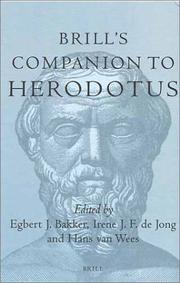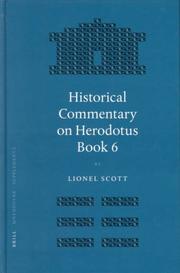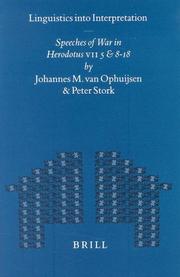| Listing 1 - 4 of 4 |
Sort by
|

ISBN: 9004120602 9004217584 9789004120600 9789004217584 9004169660 Year: 2002 Publisher: Leiden Boston
Abstract | Keywords | Export | Availability | Bookmark
 Loading...
Loading...Choose an application
- Reference Manager
- EndNote
- RefWorks (Direct export to RefWorks)
Herodotus’ Histories can be read in many ways. Their literary qualities, never in dispute, can be more fully appreciated in the light of recent developments in the study of pragmatics, narratology, and orality. Their intellectual status has been radically reassessed: no longer regarded as naïve and ‘archaic’, the Histories are now seen as very much a product of the intellectual climate of their own day - not only subject to contemporary literary, religious, moral and social influences, but actively contributing to the great debates of their time. Their reliability as historical and ethnographic accounts, a matter of controversy even in antiquity, is being debated with renewed vigour and increasing sophistication. This Companion offers an up-to-date and in-depth overview of all these current approaches to Herodotus’ remarkable work.
History, Ancient --- Histoire ancienne --- Historiography. --- Historiographie --- Herodotus. --- Historiography --- Herodotus --- History [Ancient ] --- History (Herodotus) --- Hērodotou historiai (Herodotus) --- Historiai (Herodotus) --- Historiae (Herodotus) --- Mousai (Herodotus) --- Herodotus (Herodotus) --- Histories (Herodotus) --- Musae (Herodotus) --- Hērodotou Halikarnēssēos Historiōn logoi ennea (Herodotus) --- Historiōn logoi ennea (Herodotus) --- History, Ancient - Historiography

ISBN: 9004145060 9789004145061 9781429453592 1429453591 9781433707223 1433707225 1280868473 9781280868474 9786610868476 6610868476 9047407989 9789047407980 Year: 2005 Volume: 268 Publisher: Leiden Boston Brill
Abstract | Keywords | Export | Availability | Bookmark
 Loading...
Loading...Choose an application
- Reference Manager
- EndNote
- RefWorks (Direct export to RefWorks)
This volume offers a historical and factual commentary on Herodotus book 6. The introductory discussions include one on the background to the Ionian revolt and the role of Histiaeus. The commentary aims to assess the reality behind Herodotus' text: the revolt and its aftermath; the various aspects of Spartan affairs in the middle of the book; Datis' invasion of Eretria and Attica; and Miltiades' expedition the following year. Material that cannot conveniently be dealt with in the commentary itself, and a number of related topics that merit consideration, are considered in a series of appendices. These include discussions of Cleomenes' madness in relation to his activities in Arcadia, and the Argive reaction to his victory at Sepeia.
Herodotus. --- Greece --- Grèce --- History --- Historiography. --- Histoire --- Historiographie --- Historiography --- Grèce --- Griechenland --- Hellas --- Yaṿan --- Vasileion tēs Hellados --- Hellēnikē Dēmokratia --- République hellénique --- Royaume de Grèce --- Kingdom of Greece --- Hellenic Republic --- Ancient Greece --- Ελλάδα --- Ellada --- Ελλάς --- Ellas --- Ελληνική Δημοκρατία --- Ellēnikē Dēmokratia --- Elliniki Dimokratia --- Grecia --- Grčija --- Hellada --- اليونان --- يونان --- al-Yūnān --- Yūnān --- 希腊 --- Xila --- Греция --- Gret︠s︡ii︠a︡ --- Herodotus --- Persian wars , 500-449 B.C. --- Ionian Revolt, 499-494 B.C. --- Historical criticism --- Authorship --- Criticism --- Ionian Revolt (Greece : 499-494 B.C.) --- Persian Wars (Greece : 500-449 B.C.) --- History (Herodotus) --- Hērodotou historiai (Herodotus) --- Historiai (Herodotus) --- Historiae (Herodotus) --- Mousai (Herodotus) --- Herodotus (Herodotus) --- Histories (Herodotus) --- Musae (Herodotus) --- Hērodotou Halikarnēssēos Historiōn logoi ennea (Herodotus) --- Historiōn logoi ennea (Herodotus) --- 500-449 B.C --- Greece. --- Gret͡sii͡ --- Greece - History - Ionian Revolt, 499-494 B.C. - Historiography --- Greece - History - Persian Wars, 500-449 B.C. - Historiography
Book
ISBN: 0802057934 080207684X 9786612039652 1282039652 1442675772 9781442675773 9780802076847 9780802057938 Year: 1989 Volume: 23 23 Publisher: Toronto
Abstract | Keywords | Export | Availability | Bookmark
 Loading...
Loading...Choose an application
- Reference Manager
- EndNote
- RefWorks (Direct export to RefWorks)
Herodotus was the first writer in the West to conceive the value of creating a record of the recent past. He found a way to co-ordinate the often conflicting data of history, ethnology, and culture. The Historical Method of Herodotus explores the intellectual habits and the literary principles of this pioneer writer of prose. Donald Lateiner argues, against the perception that Herodotus' work seems amorphous and ill organized, that the Histories contain their own definition of historical significance. He examines patterns of presentation and literary structure in narratives, speeches, and direct communications to the reader, in short, the conventions and rhetoric of history as Herodotus created it. This rhetoric includes the use of recurring themes, the relation of speech to reported actions, indications of doubt, stylistic idiosyncrasies, frequent reference to nonverbal behaviours, and strategies of opening and ending. Lateiner shows how Herodotus sometimes suppresses information on principle and sometimes compels the reader to choose among contending versions of events. His inventories of Herodotus' methods allow the reader to focus on typical practice, not misleading exception. In his analysis of the structuring concepts of the Histories, Lateiner scrutinizes Herodotean time and chronology. He considers the historian's admiration for ethnic freedom and autonomy, the rule of law, and the positive values of conflict. Despite these apparent biases, he argues, the text's intellectual and moral preferences present a generally cool and detached account from which an authorial personality rarely emerges.The Historical Method of Herodotus illuminates the idiosyncrasies and ambitious nature of a major text in classics and the Western tradition and touches on aspects of historiography, ancient history, rhetoric, and the history of ideas.
Historiography. --- Herodotus. --- Greece --- History --- Historical criticism --- Authorship --- Criticism --- Historiography --- Griechenland --- Grèce --- Hellas --- Yaṿan --- Vasileion tēs Hellados --- Hellēnikē Dēmokratia --- République hellénique --- Royaume de Grèce --- Kingdom of Greece --- Hellenic Republic --- Ancient Greece --- Ελλάδα --- Ellada --- Ελλάς --- Ellas --- Ελληνική Δημοκρατία --- Ellēnikē Dēmokratia --- Elliniki Dimokratia --- Grecia --- Grčija --- Hellada --- اليونان --- يونان --- al-Yūnān --- Yūnān --- 希腊 --- Xila --- Греция --- Gret︠s︡ii︠a︡ --- Methodology. --- Herodot --- Hérodote --- Herodotos --- Herodotus van Halicarnassus --- Herodotus --- Gerodot --- Hērodotos --- Erodoto --- Hérodote --- Heródoto --- הירודוטוס --- הרודוט --- הרודוטוס --- هردوت --- هيرودوت --- Ἡρόδοτος --- History (Herodotus) --- Hērodotou historiai (Herodotus) --- Historiai (Herodotus) --- Historiae (Herodotus) --- Mousai (Herodotus) --- Herodotus (Herodotus) --- Histories (Herodotus) --- Musae (Herodotus) --- Hērodotou Halikarnēssēos Historiōn logoi ennea (Herodotus) --- Historiōn logoi ennea (Herodotus) --- Greece. --- Grece --- Gret͡sii͡ --- Histoire --- Historiographie.

ISBN: 9004114556 9004351264 9789004114555 Year: 1999 Volume: 195 Publisher: Leiden : E.J. Brill,
Abstract | Keywords | Export | Availability | Bookmark
 Loading...
Loading...Choose an application
- Reference Manager
- EndNote
- RefWorks (Direct export to RefWorks)
This volume is a sustained exercise in the genre of secondary literature which aims at explaining a literary work as much as possible in and through the author's own words. A crucial passage in direct speech by different speakers from the History of Herodotus, the earliest long Greek prose text, has been made the object of a systematic effort to distill and analyse the linguistic characteristics relevant to its interpretation, by confronting it with the rest of the work as well as with earlier and contemporary writings. This is done with the primary aim of placing the interpretation of a major author on the firmest ground available, the author's inches per secondissimi verba . The result, made accessible by full indexes, will prove helpful to readers of any part of Herodotus' History .
Guerre dans la littérature --- Oorlog in de literatuur --- Parole (Linguistique) dans la littérature --- Speech in literature --- Spraak in de literatuur --- War in literature --- Speeches, addresses, etc., Greek --- Discours grecs --- Parole dans la littérature --- History and criticism --- Histoire et critique --- Herodotus --- Herodotus. --- Literary style. --- Greece --- Grèce --- History --- Histoire --- Speech in literature. --- War in literature. --- History and criticism. --- -War in literature --- Greek orations --- Greek speeches --- -Herodot --- Gerodot --- Hērodotos --- Erodoto --- Hérodote --- Heródoto --- הירודוטוס --- הרודוט --- הרודוטוס --- هردوت --- هيرودوت --- Ἡρόδοτος --- Literary style --- -Literature and the war. --- -Literary style --- Hérodote --- Herodotos --- Parole dans la littérature --- Guerre dans la littérature --- Grèce --- Herodot --- Griechenland --- Hellas --- Yaṿan --- Vasileion tēs Hellados --- Hellēnikē Dēmokratia --- République hellénique --- Royaume de Grèce --- Kingdom of Greece --- Hellenic Republic --- Ancient Greece --- Ελλάδα --- Ellada --- Ελλάς --- Ellas --- Ελληνική Δημοκρατία --- Ellēnikē Dēmokratia --- Elliniki Dimokratia --- Grecia --- Grčija --- Hellada --- اليونان --- يونان --- al-Yūnān --- Yūnān --- 希腊 --- Xila --- Греция --- Gret︠s︡ii︠a︡ --- Literature and the wars. --- Speeches, addresses, etc. [Greek ] --- Herodotus - Literary style. --- Herodotus. - History. - Book 7. --- Greece - History - Persian Wars, 500-449 B.C. - Literature and the wars. --- Herodotus van Halicarnassus --- Speeches, addresses, etc., Greek. --- Literature --- Style, Literary --- Language and languages --- Rhetoric --- Style --- Persian Wars (Greece : 500-449 B.C.) --- History (Herodotus) --- Hērodotou historiai (Herodotus) --- Historiai (Herodotus) --- Historiae (Herodotus) --- Mousai (Herodotus) --- Herodotus (Herodotus) --- Histories (Herodotus) --- Musae (Herodotus) --- Hērodotou Halikarnēssēos Historiōn logoi ennea (Herodotus) --- Historiōn logoi ennea (Herodotus) --- 500-449 B.C. --- Greece. --- Gret͡sii͡ --- Speeches, addresses, etc., Greek - History and criticism.
| Listing 1 - 4 of 4 |
Sort by
|

 Search
Search Feedback
Feedback About UniCat
About UniCat  Help
Help News
News